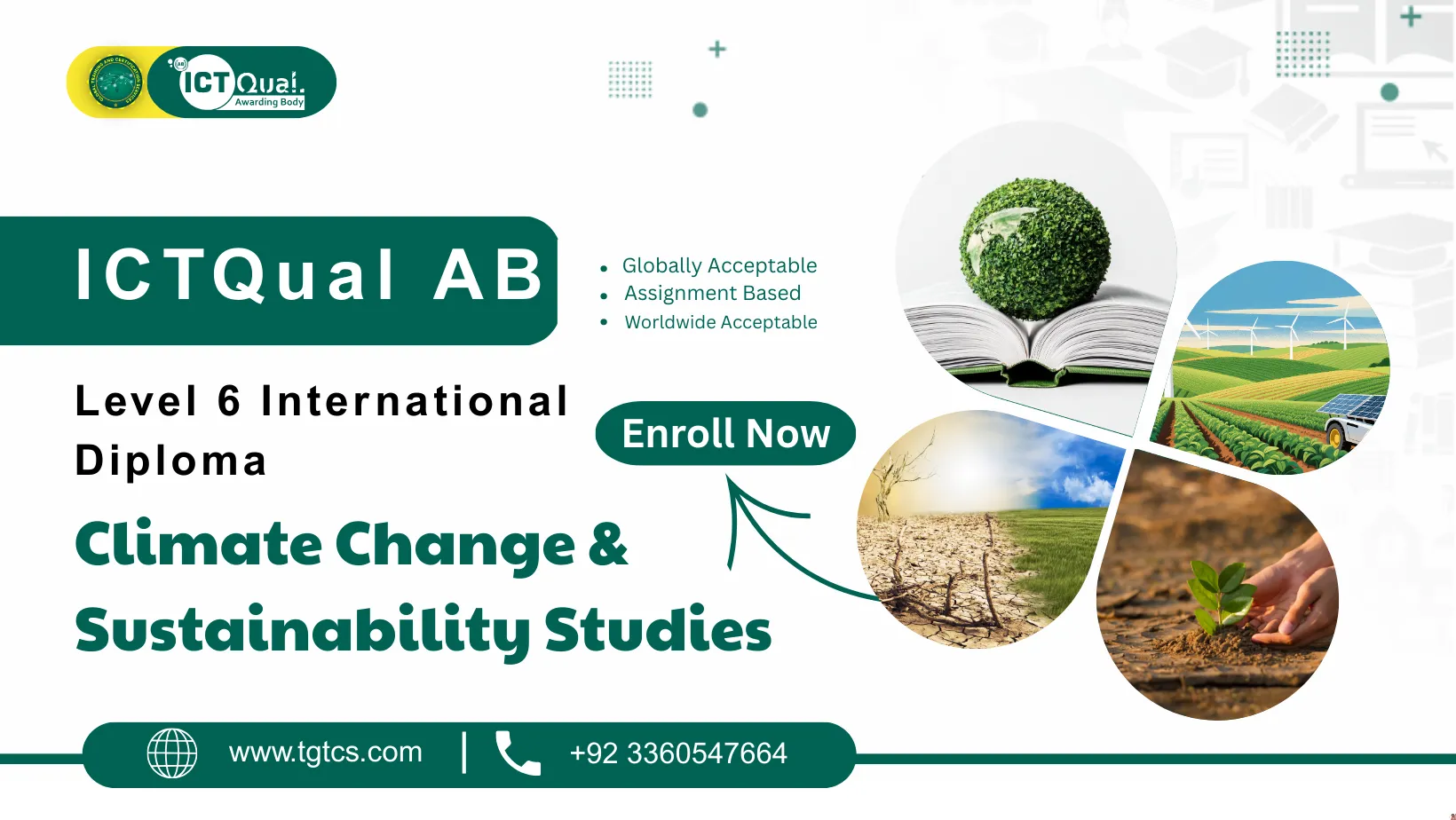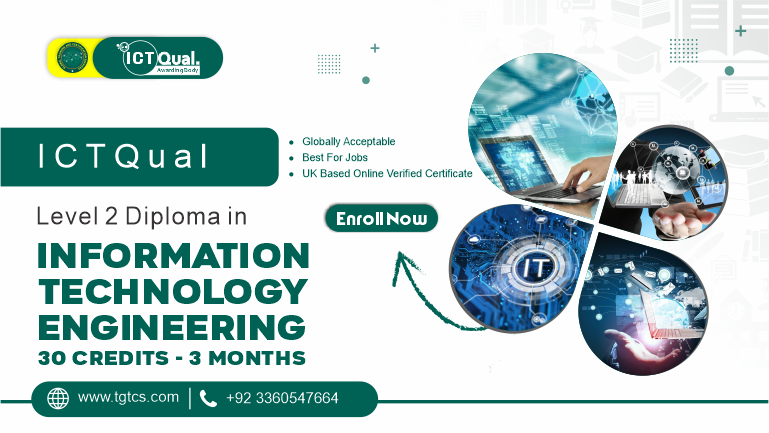ICTQual AB Level 6 International Diploma in Climate Change & Sustainability Studies
In today’s rapidly evolving global landscape, addressing climate change and promoting sustainable development have become critical priorities for governments, businesses, and communities worldwide. The ICTQual AB Level 6 International Diploma in Climate Change & Sustainability Studies equips learners with the advanced knowledge, practical skills, and strategic insight necessary to understand and combat climate-related challenges while fostering sustainable solutions.
This comprehensive course is designed for professionals, environmental practitioners, policymakers, and sustainability enthusiasts who seek to make a tangible impact in mitigating climate change and promoting environmental stewardship. Learners will explore the scientific, economic, and social dimensions of climate change, gaining expertise in climate policy analysis, sustainable resource management, environmental risk assessment, and renewable energy solutions.
Throughout the program, students will develop the ability to design, implement, and evaluate sustainability strategies across various sectors. Emphasis is placed on practical applications, including carbon footprint reduction, climate adaptation planning, green technology integration, and sustainability reporting. By combining theoretical frameworks with hands-on case studies and project-based learning, this course ensures graduates are fully prepared to meet the demands of contemporary environmental and sustainability challenges.
Upon completion, learners will emerge as confident professionals capable of driving sustainable initiatives, influencing environmental policy, and leading organizational transformations towards greener, more resilient practices. The program also enhances employability in climate research, sustainability consulting, environmental management, and corporate social responsibility roles.
The Global Training and Certification Services is Approved Training Centre of ICTQual AB UK Ltd
Course Level and Credits
Level 6 International Diploma, 360 credits.
Suitable for professionals, environmental practitioners, policymakers, entrepreneurs, and students seeking advanced knowledge in climate change, sustainability, and environmental management.
Mode of Study
Fully assignment-based; learn at your own pace.
Accessible from anywhere in the world, flexible for working professionals and career changers.
Global Recognition & Attestation
British Council verifiable, MOFA and Embassy attested.
Recognized for career advancement, employment, and professional credibility in international environmental, sustainability, and corporate roles.
Scope and Purpose
Comprehensive coverage of climate change, sustainability strategies, environmental policy, and green technology integration.
Focus on both theoretical understanding and practical application in climate adaptation, carbon footprint reduction, renewable energy, and sustainability management.
Skills and Knowledge Gained
Climate change management, sustainability studies, environmental risk assessment, climate policy analysis, and renewable energy solutions.
Leadership, strategic decision-making, and practical implementation skills for driving sustainability initiatives in organizations and communities.
Career Benefits
Opens opportunities in environmental consulting, sustainability management, renewable energy projects, climate research, and corporate social responsibility roles.
Enhances professional credibility, employability, and global recognition in sustainability and environmental management sectors.
Target Audience
Professionals, environmental managers, entrepreneurs, researchers, and students aiming for careers in climate change mitigation, sustainability studies, and environmental leadership.
Unique Selling Points (USPs)
Flexible self-paced study, fully assignment-based.
Prestigious and globally recognized Level 6 diploma.
Ideal for leadership roles, international career advancement, and enhancing professional credentials in sustainability and environmental sectors.
Mandatory Unit
This qualification, theICTQual AB Level 6 International Diploma in Climate Change & Sustainability Studies, consists of 36 mandatory units.
Year 1 – Foundations of Climate Change & Sustainability
- Introduction to Climate Change Science
- Principles of Sustainability and Environmental Management
- Global Environmental Policies and Governance
- Carbon Footprint and Greenhouse Gas Accounting
- Renewable Energy Fundamentals
- Climate Change Impacts and Adaptation Strategies
- Environmental Ethics and Professional Responsibility
- Sustainable Resource Management
- Environmental Monitoring and Data Analysis
- Introduction to Project Planning in Climate Initiatives
- Environmental Communication and Stakeholder Engagement
- Introduction to Risk Assessment in Environmental Management
Year 2 – Applied Climate Change & Sustainability Practices
- Advanced Climate Change Mitigation Strategies
- Sustainable Urban and Industrial Development
- Environmental Impact Assessment (EIA)
- Carbon Management and Trading
- Energy Efficiency and Renewable Integration
- Climate Policy Implementation and Compliance
- Waste Management and Circular Economy Principles
- Environmental Auditing and Reporting Techniques
- Digital Tools and Technologies for Sustainability
- Organisational Behaviour and Sustainability Leadership
- Research Methods in Climate and Sustainability Projects
- Applied Project Planning and Operational Management
Year 3 – Strategic Leadership in Climate Change & Sustainability
- Strategic Sustainability Leadership
- International Climate Agreements and Standards
- Environmental Risk and Crisis Management
- Corporate Social Responsibility (CSR) and Sustainability Strategy
- Sustainable Supply Chain and Resource Management
- Innovation and Emerging Technologies in Sustainability
- Climate Change Policy Development and Implementation
- Environmental Governance and Ethics in Leadership
- Advanced Project Management for Sustainability Initiatives
- Renewable Energy Systems and Integration Strategies
- Independent Research Project in Climate Change & Sustainability
- Capstone Project: Applied Climate Change & Sustainability Studies
The ICTQual AB Level 6 International Diploma in Climate Change & Sustainability Studies is designed to equip learners with advanced knowledge, practical skills, and strategic expertise in climate change mitigation, sustainability management, and environmental leadership.
Year 1 – Foundations of Climate Change & Sustainability
Introduction to Climate Change Science
- Understand the scientific principles behind climate change and global warming
- Analyze historical climate trends and their environmental impacts
- Examine the role of human activities in greenhouse gas emissions
- Explore climate modeling and predictive tools for environmental assessment
Principles of Sustainability and Environmental Management
- Understand key sustainability concepts and frameworks
- Apply environmental management principles in organizational contexts
- Explore strategies for sustainable resource use and conservation
- Develop skills to integrate sustainability into decision-making
Global Environmental Policies and Governance
- Understand international environmental agreements and protocols
- Analyze policy frameworks for climate change mitigation and adaptation
- Examine the roles of governments, NGOs, and global institutions in sustainability
- Assess the effectiveness of environmental governance mechanisms
Carbon Footprint and Greenhouse Gas Accounting
- Measure and calculate carbon emissions in various sectors
- Understand methodologies for greenhouse gas accounting and reporting
- Explore strategies to reduce organizational and individual carbon footprints
- Apply carbon auditing techniques to sustainability initiatives
Renewable Energy Fundamentals
- Understand different renewable energy sources and technologies
- Analyze the benefits and challenges of renewable energy adoption
- Evaluate the environmental and economic impacts of renewable systems
- Explore practical applications for integrating renewable energy into projects
Climate Change Impacts and Adaptation Strategies
- Identify environmental, social, and economic impacts of climate change
- Develop strategies for climate adaptation and resilience building
- Analyze case studies of effective adaptation initiatives
- Apply risk assessment to climate vulnerability management
Environmental Ethics and Professional Responsibility
- Understand ethical principles in environmental decision-making
- Evaluate professional responsibilities in sustainability roles
- Apply ethical reasoning to climate change and resource management challenges
- Promote responsible practices in environmental and corporate settings
Sustainable Resource Management
- Analyze sustainable practices in water, energy, and land use
- Explore methods for efficient resource allocation and conservation
- Implement strategies for long-term environmental sustainability
- Understand the economic and social implications of resource management
Environmental Monitoring and Data Analysis
- Collect and analyze environmental data using modern techniques
- Interpret monitoring results to inform sustainability strategies
- Utilize statistical and digital tools for environmental assessment
- Apply findings to support policy and project decisions
Introduction to Project Planning in Climate Initiatives
- Develop foundational project planning skills for climate initiatives
- Understand project lifecycle, objectives, and resource management
- Identify key performance indicators for sustainability projects
- Apply planning tools to ensure effective project delivery
Environmental Communication and Stakeholder Engagement
- Learn strategies for effective environmental communication
- Engage stakeholders in sustainability initiatives and policy advocacy
- Develop reports, presentations, and campaigns for environmental awareness
- Apply negotiation and collaboration skills for project success
Introduction to Risk Assessment in Environmental Management
- Identify potential environmental risks in projects and operations
- Conduct basic risk assessments and mitigation planning
- Understand regulatory requirements for environmental risk management
- Apply risk analysis to support decision-making and sustainability goals
Year 2 – Applied Climate Change & Sustainability Practices
Advanced Climate Change Mitigation Strategies
- Analyze and implement mitigation approaches across sectors
- Explore carbon reduction, renewable energy, and low-emission technologies
- Evaluate cost-effectiveness and feasibility of mitigation projects
- Develop strategic plans to reduce organizational environmental impact
Sustainable Urban and Industrial Development
- Apply sustainability principles to urban planning and industrial design
- Assess environmental impacts of urban and industrial growth
- Design eco-friendly infrastructure and resource-efficient systems
- Integrate climate adaptation and resilience measures into planning
Environmental Impact Assessment (EIA)
- Conduct EIAs for projects and policy interventions
- Understand regulatory frameworks and compliance requirements
- Analyze environmental, social, and economic impacts of projects
- Recommend mitigation strategies based on EIA results
Carbon Management and Trading
- Explore carbon trading mechanisms and market instruments
- Analyze corporate carbon reduction strategies and compliance
- Apply tools for carbon accounting and emissions reporting
- Evaluate economic and environmental benefits of carbon management
Energy Efficiency and Renewable Integration
- Identify opportunities to improve energy efficiency in organizations
- Develop strategies for integrating renewable energy solutions
- Measure energy performance and optimize resource use
- Apply best practices for sustainable energy management
Climate Policy Implementation and Compliance
- Understand national and international climate policy frameworks
- Analyze policy instruments for effective sustainability outcomes
- Apply strategies to ensure regulatory compliance in organizations
- Evaluate policy effectiveness in reducing environmental impacts
Waste Management and Circular Economy Principles
- Explore sustainable waste management and recycling techniques
- Implement circular economy practices to reduce resource consumption
- Analyze waste reduction and resource recovery strategies
- Develop initiatives for zero-waste and sustainable production
Environmental Auditing and Reporting Techniques
- Conduct environmental audits and compliance assessments
- Prepare sustainability reports in line with international standards
- Evaluate organizational performance against environmental goals
- Recommend improvements based on audit findings
Digital Tools and Technologies for Sustainability
- Utilize software and digital solutions for sustainability management
- Apply GIS, modeling, and monitoring tools in climate initiatives
- Analyze environmental data for informed decision-making
- Explore emerging digital technologies in sustainable practices
Organisational Behaviour and Sustainability Leadership
- Understand organizational dynamics in implementing sustainability initiatives
- Develop leadership and change management skills for environmental projects
- Foster a culture of sustainability within organizations
- Apply motivational and strategic skills to lead climate-focused teams
Research Methods in Climate and Sustainability Projects
- Apply research methodologies for climate and sustainability studies
- Collect, analyze, and interpret environmental and social data
- Conduct literature reviews and evidence-based project design
- Develop skills for academic and applied research in sustainability
Applied Project Planning and Operational Management
- Plan, manage, and execute sustainability projects effectively
- Allocate resources and set performance targets for environmental initiatives
- Monitor project outcomes and implement corrective measures
- Apply operational strategies for sustainable program delivery
Year 3 – Strategic Leadership in Climate Change & Sustainability
Strategic Sustainability Leadership
- Develop strategic vision for sustainability initiatives
- Lead organizational change towards climate-resilient practices
- Integrate innovation and stakeholder engagement into leadership
- Monitor long-term sustainability performance and impact
International Climate Agreements and Standards
- Understand the key global climate agreements and frameworks
- Apply international standards to local and organizational contexts
- Assess compliance and effectiveness of climate policies
- Support policy alignment and reporting for sustainability goals
Environmental Risk and Crisis Management
- Identify and mitigate environmental risks and potential crises
- Develop contingency and adaptation strategies
- Apply risk management principles to sustainability challenges
- Ensure organizational resilience against climate-related threats
Corporate Social Responsibility (CSR) and Sustainability Strategy
- Integrate CSR initiatives with organizational sustainability goals
- Evaluate social, environmental, and economic impacts of CSR programs
- Design strategies for community engagement and environmental stewardship
- Align business practices with ethical and sustainable principles
Sustainable Supply Chain and Resource Management
- Implement sustainable practices in supply chain management
- Optimize resource use and reduce environmental impact across operations
- Monitor supplier compliance with sustainability standards
- Apply circular economy principles in resource management
Innovation and Emerging Technologies in Sustainability
- Explore cutting-edge technologies for climate change mitigation
- Evaluate innovative solutions for renewable energy, waste, and water management
- Integrate technology to enhance sustainability outcomes
- Promote continuous improvement and innovation in projects
Climate Change Policy Development and Implementation
- Develop, evaluate, and implement climate-related policies
- Apply analytical skills to assess policy impacts and feasibility
- Integrate stakeholder consultation in policy formulation
- Monitor compliance and adjust strategies for maximum effectiveness
Environmental Governance and Ethics in Leadership
- Apply ethical frameworks in environmental decision-making
- Ensure governance structures support sustainable development
- Promote transparency, accountability, and stakeholder trust
- Lead initiatives that align with international sustainability standards
Advanced Project Management for Sustainability Initiatives
- Plan, execute, and monitor complex sustainability projects
- Apply advanced project management methodologies
- Optimize project outcomes through strategic resource allocation
- Ensure integration of sustainability principles in project delivery
Renewable Energy Systems and Integration Strategies
- Design and implement renewable energy solutions in organizations
- Integrate multiple renewable technologies for optimal energy efficiency
- Analyze economic and environmental benefits of renewable integration
- Apply practical strategies to transition to low-carbon energy systems
Independent Research Project in Climate Change & Sustainability
- Conduct a research project addressing a specific climate or sustainability challenge
- Apply academic and practical research methodologies
- Analyze results to propose evidence-based solutions
- Communicate findings through formal reports and presentations
Capstone Project: Applied Climate Change & Sustainability Studies
- Implement an applied sustainability project with measurable impact
- Integrate knowledge from all course units to solve real-world challenges
- Demonstrate leadership, problem-solving, and strategic decision-making
- Present outcomes to stakeholders, showcasing professional competence
The ICTQual AB Level 6 International Diploma in Climate Change & Sustainability Studies provides learners with the essential knowledge, practical skills, and leadership abilities needed to excel in climate action, sustainability initiatives, and environmental management globally.
Enhanced Career Opportunities
- Gain an internationally recognized Level 6 qualification in climate change and sustainability
- Access leadership and strategic roles in environmental consulting, sustainability management, and climate policy
Practical Skills Development
- Acquire expertise in climate change mitigation, renewable energy systems, and sustainable resource management
- Develop hands-on experience in environmental monitoring, risk assessment, and project planning
Strategic and Analytical Competence
- Learn to analyze environmental data and implement sustainability strategies effectively
- Build decision-making skills for planning, executing, and managing sustainability initiatives
Policy and Regulatory Knowledge
- Understand international climate agreements, environmental laws, and sustainability standards
- Apply policy frameworks to ensure organizational compliance and sustainable practices
Innovation and Leadership in Sustainability
- Drive innovative solutions for renewable energy, circular economy, and climate adaptation projects
- Cultivate leadership skills to lead sustainability initiatives and influence environmental change
This course empowers learners to become confident professionals capable of shaping sustainable policies, implementing impactful environmental projects, and leading global initiatives in climate change and sustainability studies.
The ICTQual AB Level 6 International Diploma in Climate Change & Sustainability Studies is designed for learners who aim to make a significant impact in climate action, sustainability management, and environmental leadership.
Environmental Professionals
- Enhance your expertise in climate change mitigation and sustainable resource management
- Apply advanced sustainability practices to drive positive environmental outcomes
Career Changers in Sustainability
- Transition into the climate change and sustainability sector with practical skills
- Gain knowledge to take on strategic and leadership roles in environmental organizations
Industry Managers and Supervisors
- Improve leadership and decision-making skills for implementing sustainability initiatives
- Ensure organizational compliance with environmental regulations and sustainability standards
Entrepreneurs and Business Leaders
- Develop insights to establish or expand eco-friendly businesses and sustainability projects
- Learn to integrate circular economy practices and green technology in operations
Academics and Researchers
- Deepen understanding of climate change science, sustainability strategies, and environmental policy
- Conduct research projects and contribute to innovation in climate and sustainability solutions
This course prepares learners to become confident professionals and leaders capable of designing, implementing, and managing impactful sustainability and climate change initiatives across organizations and communities globally.
Course Overview
Course Level
Level 6
Course Units
36 Units
Credits
360
Duration
3 years






